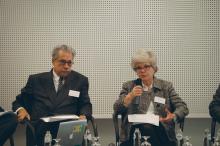The Water Project is the result of a three-year partnership between Cemex and the
The roll out of this methodology will focus initially on measuring the company’s water footprint, and secondly on defining actions to increase its water efficiency and reduce its water usage.
As water-stressed regions are predicted to expand and increase, so does the level of risk faced by businesses that rely on water. Water is an important natural asset for the production of cement, ready-mix concrete, and aggregates at Cemex sites around the world. Accordingly, sharing available water resources equitably among all stakeholders, including ecosystems, and reducing risk for business operators are key components of the Cemex-IUCN partnership.
“Sustainability is embedded in Cemex’s business strategy and day-to-day operations. Under existing climate change scenarios, it is predicted that almost half of the world’s population will live in areas of high water stress by 2030. Therefore, it is our responsibility to ensure that efficient water management plays an important role in our business. As Cemex strives to minimise its environmental footprint, partnering with IUCN helps our company to reduce risk, be good stewards of the environment, and ensure we provide the greatest value for our stakeholders,” says Luis Farias, Cemex’s senior vice president of energy and sustainability.
“Water is a resource for which there is no substitute. Without adequate supplies of water, not only do businesses face serious risks, but also do public water providers and ecosystems. In partnering with IUCN, Cemex is working to achieve improved water management across its operations, maintain access to sustainable sources of water, and reduce risks associated with water for the company,” says Dr James Dalton, IUCN water programme coordinator, global initiatives.
The Cemex-IUCN Water Project was presented to members of the European Commission in Brussels, Belgium, and during a one-day conference, Cemex and IUCN shared lessons learned and ways forward towards improved sustainability of water resources.
The event was hosted by the Spanish Permanent Representation to the European Union; members of the
Key participants included Dr Mark Smith, director IUCN global water programme; Dr Dalton, and Benedikt Jodocy, vice president legal and sustainability, Cemex, Germany.









